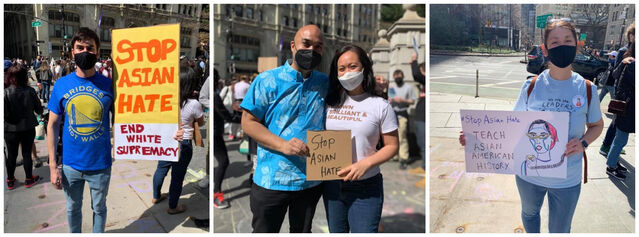Race and Ethnicity
The Mental State of Asian Americans and Pacific Islanders
Reflections on AAPI heritage and mental health awareness.
Posted May 6, 2021 Reviewed by Lybi Ma
Key points
- Hate violence increases racial trauma and many other mental health concerns for Asian Americans and Pacific Islanders.
- Prior to the pandemic, AAPIs have been susceptible to myriad mental health inequities, such as depression, substance use, and suicide.
- Normalizing conversations on mental health, wellness, and treatment may be helpful for AAPI families and communities.
May is both Asian American and Pacific Islander Heritage Month (AAPIHM) and Mental Health Awareness Month, which makes it the perfect time to reflect on the intersections of mental health and AAPIs in the United States. As an Asian American psychologist who has committed my life to study psychological issues affecting Filipino Americans, AAPIs, and other minoritized groups, this month also becomes a perfect time to premiere my blog “Psychology for The People” on Psychology Today.
I begin by acknowledging that May 2021 is a unique moment in time. While we, as a society, are still amidst a global pandemic, we are also facing a racial pandemic in this country. First, the murders of George Floyd, Breonna Taylor, and others have uncovered, for many, the systemic oppression towards Black people in the US. Second, the increase in anti-Asian rhetoric and subsequent violence has highlighted the historical racism towards Asian Americans too.
Accordingly, AAPIHM 2021 comes after a year of agony caused by the COVID-19 pandemic and its aftermath. For example, although some initial studies reported Asian Americans were generally not affected by COVID-19 any more than white Americans, recent reports have revealed how Pacific Islanders and Filipino American nurses are disproportionately dying of the virus. Further, while a current COVID-19 surge has resulted in thousands of deaths of Indians daily, Indian Americans stateside continue to mourn the four Sikh elders killed in Indianapolis last month. Hate violence has devastated Asian Americans nationally, with thousands of reported cases of violent assaults towards Asian Americans across the US—including the murders of Korean and Chinese immigrant women in Atlanta, a Filipino man in Arizona, a Thai man in San Francisco, a Vietnamese man in Washington, an East Asian man in Oakland, a Vietnamese man in Indiana, and a South Asian man in Utah. In New York and San Francisco, these attacks are relentless, with reports of anti-Asian violence emerging almost daily.

Furthermore, research has demonstrated the devastating impacts of the global pandemic on mental health in general; with one study finding that 42 percent of Americans reported depression and anxiety symptoms in 2020, compared to just 11 percent in 2019. There are many explanations for this surge in mental illness, including grief from losing loved ones; fears of getting sick, or a loved one getting sick; distress from working or learning from home; loss of employment or financial income; isolation or lack of in-person social support; lack of physical touch, connection, or intimacy; or general questioning of life or one’s purpose, to name a few. Young people are especially vulnerable, with one study citing 25 percent of youth had seriously considered suicide in 2020.
What is even more troubling is that AAPIs had already struggled with mental health issues prior to these pandemics. For example, previous research has revealed Native Hawaiians and Samoans experience myriad behavioral health concerns, like alcohol abuse, depression, and suicide. Micronesian boys have the highest prevalence of suicide and are 11 times more likely than Micronesian girls to die by suicide. Asian Americans (especially immigrants) and Pacific Islanders underutilize mental health treatment despite reporting psychological symptoms, with underutilization rates higher than other racial groups. Further, pre-pandemic studies revealed how discrimination (including microaggressions) significantly predicts negative psychological outcomes for AAPIs.
If we know mental illness has spiked in general and that AAPIs reported greater mental health disparities prior to the pandemic, how might mental illness among AAPIs have increased even more? Further, if pre-pandemic discrimination had already predicted psychological distress for AAPIs, how would increases in racial violence affect mental health outcomes today? And finally, what can people do to assist AAPIs in addressing mental health concerns and promoting optimal psychological health?
While we wait for researchers to empirically answer the first two questions, I offer some recommendations regarding my third question. I hope these approaches help AAPIs and their allies to jumpstart conversations and enhance wellness in their communities.
- Normalize talking about mental health and wellness. Now is the time for mental health to be discussed openly and regularly with our loved ones. While cultural stigma and shame have prevented people from engaging in these conversations before, we must challenge these barriers and initiate such dialogues immediately. If you don’t know where to begin, introduce the statistic that two-fifths of Americans report depression or anxiety, normalizing that many people are suffering. Ask loved ones directly about their emotions; inquire about how their mental health has been throughout the pandemic; even question how they are coping with the traumas of COVID and racial violence. If you can ask your elders about whether they’ve gotten vaccinated, you can ask them about their mental health. When you can ask your kids about their homework, also ask them about their stressors and coping strategies.
- Normalize psychotherapy and help-seeking behaviors. With the increase in psychological distress, many people will also be in need of psychological services. Be knowledgeable of services and resources available in your community. Help them navigate Psychology Today in looking for providers (especially if they have insurance) or ask your local mental health agencies for guidance. Perhaps most importantly, share how psychotherapy or counseling has helped you, so that the process doesn’t seem so scary, foreign, or stigmatizing to them. If you are not in therapy yourself, perhaps now is the time for you to start too.
- Integrate mental health awareness into all that you do. Create spaces for conversations about wellness and health at work, in classrooms, and at family dinner tables. During community organization meetings, religious gatherings, and even social activities, make space for temperature checks and other opportunities to process feelings before delving into agendas. Understand that continuing with “business as usual” can be viewed as a form of complicity, as it communicates that productivity is more important than wellness or self-care. Further, ignoring racial trauma (like police murders of Black people or anti-Asian hate violence) communicates that events that collectively traumatize communities you do not belong are unimportant or unworthy of acknowledging.
However you celebrate or navigate this month, may you acknowledge the vast diversity of AAPI communities and intentionally center Pacific Islanders, Brown Asians, LGBTQ AAPIs, disabled AAPIs, and others who are typically excluded. May you continually challenge norms maintained through racism, colonialism, and systemic oppression. May you practice and promote radical healing within yourself and others. And may you always reflect upon the ways that you can advocate for justice and equity for all people.


